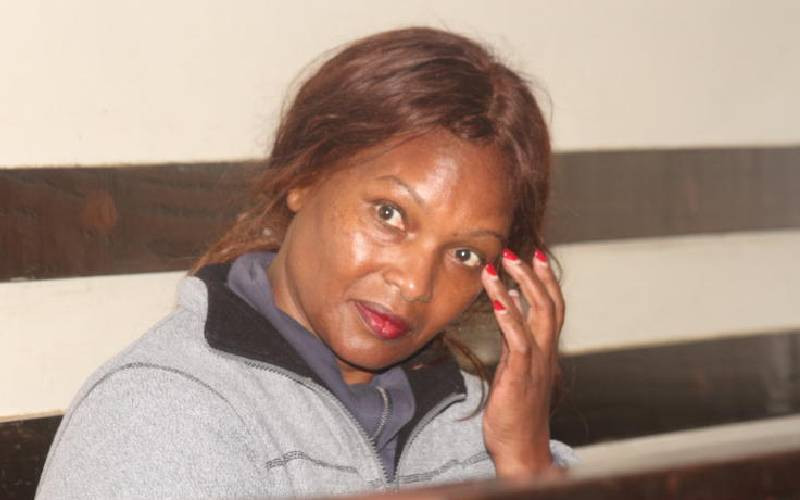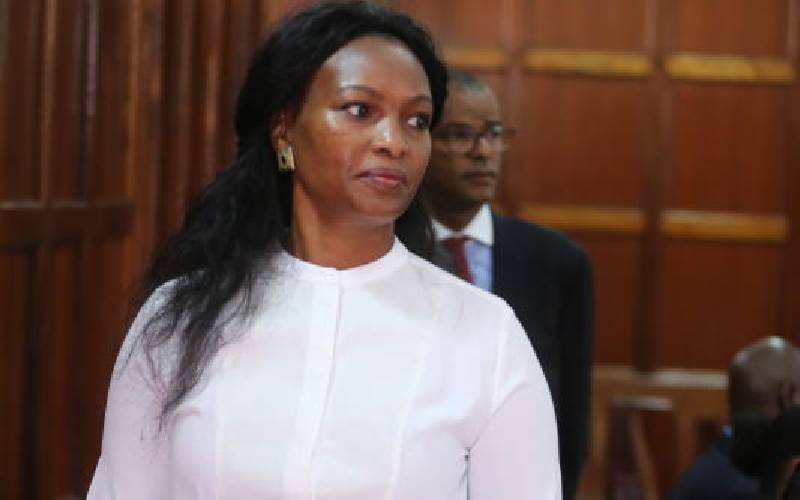The State and family of the late Tob Cohen want Sarah Wairimu Cohen to vacate the Farasi Lane house in Lower Kabete, the home where Cohen’s remains were discovered, arguing that she might interfere with crucial evidence.
They are also opposed to her being freed on bail saying that she might interfere with witnesses lined up to testify against her and might flee the country.
This revelation was made yesterday during her bail hearing in a case where she is charged with the murder of the Dutch businessman on July 20, 2019.
Wairimu will know her fate on February 18 when Justice Diana Kavedza Mochache will rule on whether to free her on bail or not.
The state said that they want her to remain behind bars until two of their witnesses under a protection program have given their testimony.
Vincent Monda and Sarah Ogweno for the State told Justice Mochache that Wairimu is likely to interfere with two witnesses if freed on bail.
“We have submitted enough material to deny bail at this stage,” said Monda.
The two-state lawyers said that they were ready to commence the trial and, if required, the witnesses could be brought to court in a week.
“Let the two witnesses testify and then we can revisit the issue of bail,” he added.
Monda said that the fact the two were under witness protection for fear of their lives was reason enough to deny her bail.
“That some of the witnesses have expressed having been intimidated, coerced and/or threatened by the accused and her proxies,” said an affidavit by the investigating officer Maxwell Otieno.
The state further alleges that during the inquest that was taking place between April and December 2024, Wairimu, through her agents, attempted to interfere with her former employees who were to testify against her.
“That the accused having been enjoined as an interested party in the inquest proceedings, she was served with committal bundles and corresponded in the above cases, we are apprehensive that she is likely to reach out to the witnesses who were her employees and are not under Witness Protection with a view to coerce, influence and/or intimidate them so that they do not attend court when required to,” added Otieno.

The state lawyers added that not only is Wairimu likely to interfere with the witnesses but she’s also a flight risk and that she has no known address where she resides.
Stay informed. Subscribe to our newsletter
According to Otieno, she should vacate a house along Farasi Lane that they say remains a crime scene and that her continued stay there may interfere with crucial evidence.
The state added that since Wairimu lives in the said house, if she were to vacate as per their request, then she would not have a permanent address and might, therefore, skip the trial, terming her a flight risk.
Justice Mochache directed the state to file an application for the two witnesses to give their testimony under protection and to have their voices distorted when testifying.
The victim’s family lawyer, Kimani Wakimaa, said that they were open to Wairimu being freed on bail so long as the two protected witnesses have testified.
Wairimu’s lawyers, led by Conrad Maloba, opposed the state’s application, saying that they had not introduced any new evidence and is no different from the 2019 one.
“Compelling reasons must be given to prove why bail she should be denied bail; this is not the first time she has been charged with the same crime and the same facts,” said Maloba.
“My client is also a victim in this case,” he added.
He said that since the state was saying that his client had tried to coerce and intimidate witnesses and that the matter was reported to the police, how come the state never followed it up?
“The allegation ought to have been investigated, yet the Office of the Director of Public Prosecutions did not direct the Directorate of Criminal Investigations to do so,” he said.
He argued that his client does not have the means or the financial capacity to intimidate witnesses who are already under the protection of the state.
Maloba argued that since the DPP has always been in charge of the case, why did they not make an application to secure what they now say is the scene of the crime that needs to be secured?
He added that the state had not tabled evidence to show that his client would skip court if granted bail.
“When she was admitted to bail, she complied with all the conditions; she never missed court,” he said.










